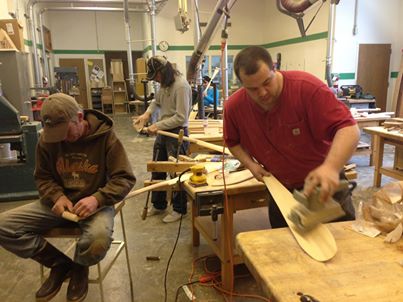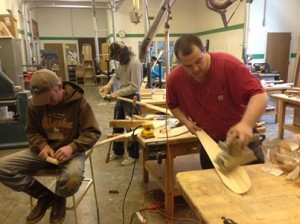Alaskan communities can be very tight-knit. And suicide rates in Alaskan communities are some of the highest in the country. Last weekend, the One People Canoe Society held a two-day paddle-making workshop in Wrangell.
As part of the workshop, the participants attended a behavioral health course on suicide prevention. Its goal is to bring communities together to both learn a traditional art and talk about a contemporary problem.
Click here for iFriendly audio.
Around 15 people are hard at work in the high school shop class, sawing, sanding and shaping paddles. What started off as rough yellow cedar boards are slowly turning into streamlined paddles.
The One People Canoe Society puts on workshops throughout southeast Alaska.
Brian and Michael Chilton make their way around the Panhandle teaching communities the art of paddle-making.
Michael says he decided to learn more about the craft after one particular trip.
“It was really inspiring when we started traveling down to Washington. They have a canoe journey that they do down there. Once we saw how much people are actually involved and know about their own culture down there, we said, why don’t we do that in Juneau?” says Chilton.
His uncle, Brian Chilton, has been carving paddles since the early 1990s and painting them for even longer. And now, he passes that knowledge on.
“We travel all over, different places, different towns, different villages- Angoon, Kake, Wrangell, POW, Ketchikan. I think we’re going to do a total of a dozen paddle workshops. This is to help them, the local canoe groups, make their own paddles. They’re actually going to use them to paddle to Juneau; it’s called the paddle to Celebration,” says Chilton.
But these paddle workshops are a forum for more than just woodcraft.
They are sponsored in part by a behavioral health grant from the Southeast Alaska Regional Health Consortium, or SEARHC. The grant funds presenters that attend the workshops and give condensed courses on suicide awareness and prevention.
Alicia Chilton is a board member for the canoe society. She says the partnership began a few years ago.
“SEARHC, Suicide: One is too many, had a canoe and so we started working together in preparation for the paddle to Celebration in 2012. Over the years, our relationships have just grown and we think it’s important with the high suicide rates that we have here, especially in Alaska and in our southeast communities,” says Chilton.
Participants in the paddle workshop spend an hour each day away from the bandsaws and sanders in a quiet classroom.
Carla Mahoskey does youth suicide prevention training for SEARHC.
“Part of our grant’s mission is to try and decrease the stigma associated with seeking mental health help,” says Mahoskey.
She shows slides with possible warning signs that a person is having suicidal thoughts. She asks the room questions like, “What would you say if a friend told you they were thinking about suicide?”
At the end of the day, there’s a quiz. She hopes her students feel more confident about finding resources in the future.
“I hope that if they see a person in need, that they’re able to go and help them and refer them to someone to get professional help if that’s needed,” says Mahoskey.
Participants leave the class with keychains and business cards, which they put in their pockets before going back to making paddles.
This melding of tradition and prevention is a natural one. They both deal with fulfillment and communication. Again, Alicia Chilton.
“You know, with the paddle workshops or the canoe journeys, it provides a level of enthusiasm that comes with learning about their native culture and wanting to get involved. Also, there’s the awareness part. Unfortunately, people have friends that have attempted suicide or that have committed suicide and it’s a big impact on the community,” says Chilton.
And, bringing community together is the reason Michael Chilton travels around, helping people carve cedar boards into beautiful paddles that they’ll use to perhaps make the journey of a lifetime.
“It’s actually really important to me because it keeps the culture alive. It keeps the passion alive. Not just in myself, though. I get to help people keep passion as far as their culture goes, all over Southeast Alaska,” says Chilton.
He says it’s about transformation, for paddles and people.













